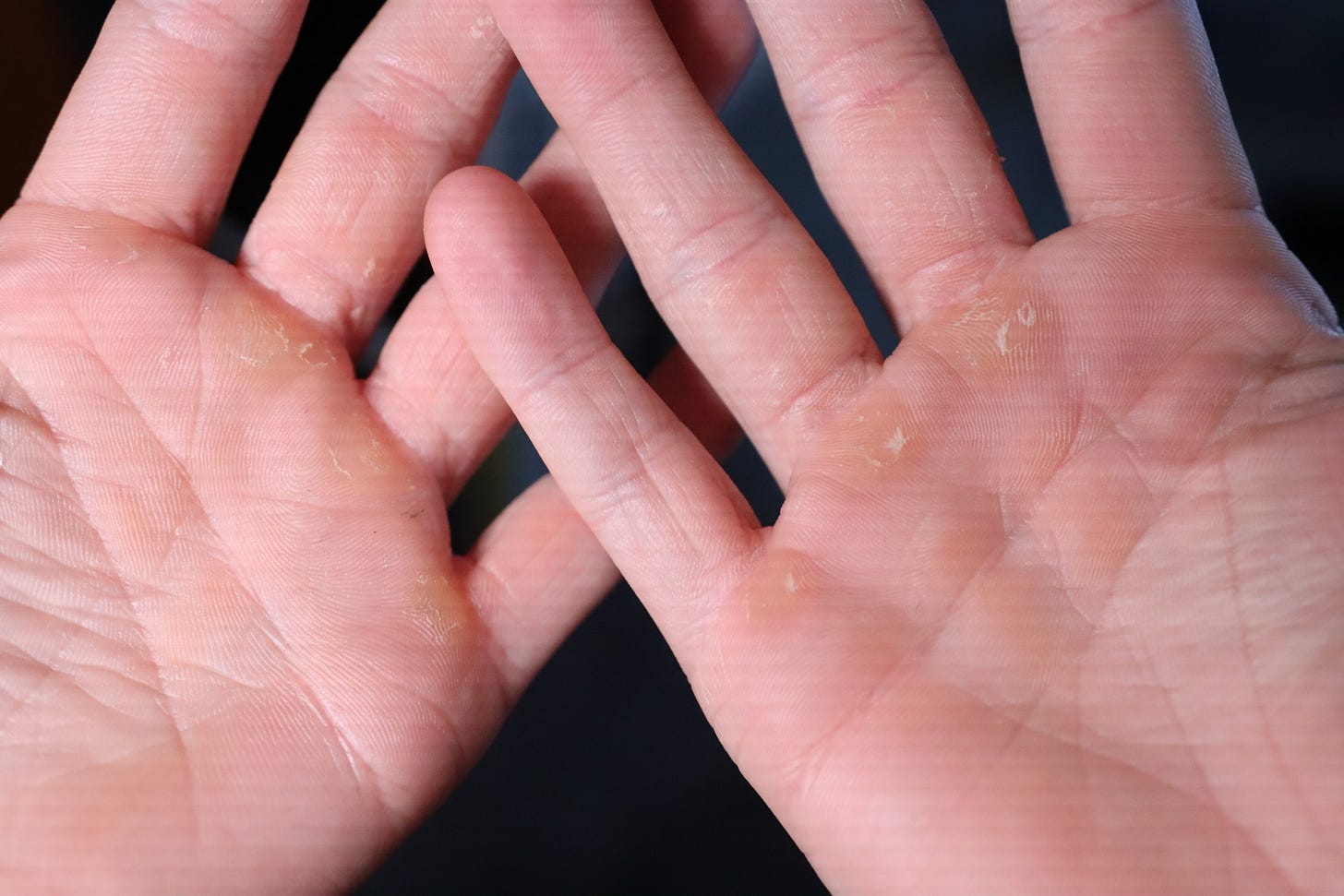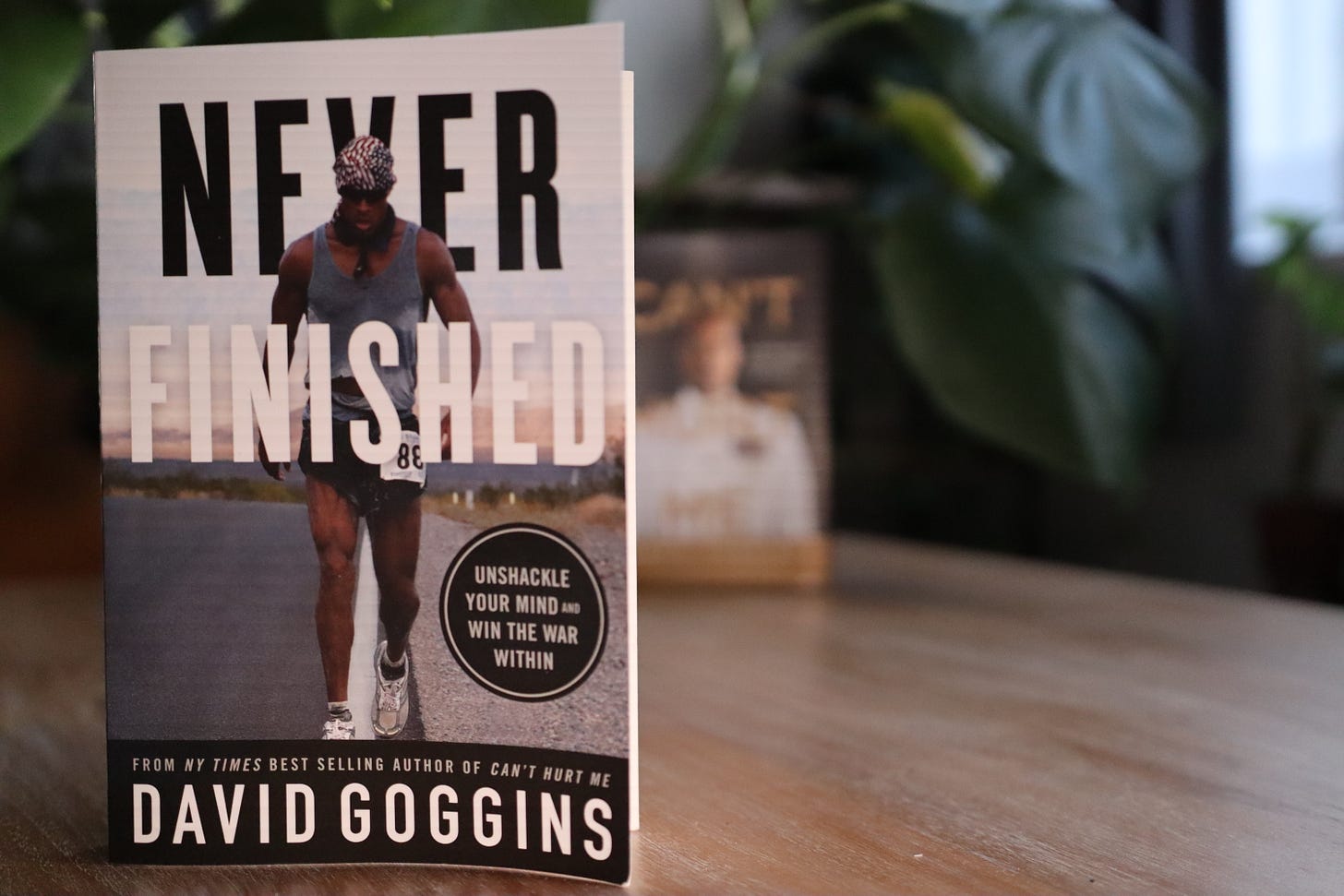David Goggins was destined to be a loser. Weighing in at almost 300 pounds and working a dead-end job, his upbringing was rife with abuse, leading to severe learning disabilities - and this could have determined the rest of his life. But he refused to let his past and current self determine his future. He was at the bottom of the mountain, and at the top, was the title of ‘The World’s Toughest Man’.
He just had to get there first.
This was no easy task, but he forged a new sense of self through the flames of his adversity. This new identity possessed an unhealthy amount of mental fortitude which he used to start building his resume. He shed 100 pounds in under 3 months, went through BUD/S on duct-taped feet and broken legs to become a Navy Seal, completed numerous ultra-marathons, and broke the world record for the most amount of pull-ups in 24 hours. He’s the real deal and knows a thing or two about quitting, or rather, how not to.
This podcast is a great jumping-off point, otherwise, his books are also filled with wisdom. I’ll share some today.
All Roads Lead to Callusing the Mind
Calluses are areas of thickened, hardened skin that forms as a response to repeated friction. Many people who lift, myself included, have callouses on their hands from frequently gripping weights.
Instead of callusing skin, Goggins’ focus is on callusing the mind. Mental resilience is created by pushing through when you feel like giving up.
Although many of the examples I will give from Goggins’ life will be something that many of us can’t even dream of doing, I want to point out that we can still learn from him.
Oftentimes we do things, or let things happen because it’s easier. We choose the easy way out because it takes less mental effort. We look for the path of least resistance, and that’s how we become weak. The mind is like a muscle, one must constantly train it to ensure its strength.
For Goggins, it’s competing in the Badwater Ultramarathon (267-mile race).
Callusing your mind doesn’t have to be as gruelling as long-distance runs (although this can certainly put you to the test) it can be something as simple as getting up early when you’d rather be sleeping in, or speaking up when you’re served the wrong food.
It’s about purposefully putting yourself in difficult situations. It’s about suffering. Callusing your mind is done through facing your fears, discomfort, or physical challenges that make you want to give up. Life is inevitably going to come at you hard and you’re going to suffer whether you like it or not. When those times come, you’ll be glad that you reinforced the foundations in your mind.
It will still be difficult but think of how worse it would be if you were a fragile little person who had never faced any adversity. It’s essential to be on the lookout for ways to callus our minds.
Never Finished
Many Dreams Die While Suffering
I had to reread this chapter a few times because it’s so true.
Planning future challenges is easy while you’re relaxing on the couch with the heat pump on during a cold day. Plan all you like, but you will feel very different when it's happening. In that moment you could be in an immense amount of pain with nothing but your mind to keep you company, whispering that you could be in the comfort of your own home if you quit now.
These are the moments when you are likely to surrender.
So how do you keep going?
Let’s say you were planning on competing in a race. Beforehand, you should be aware of the difficulty of the race that you are going to undertake and that thoughts of quitting will enter your mind. Knowing they will come helps relieve the pressure for when they actually do.
Then, remind yourself why you are there. Remind yourself, that you chose to do something hard and this is what hard feels like.
Finishing the race is contingent on you putting up a fight when your mind is telling you otherwise.
“Maybe it’s twenty miles or twenty days or twenty weeks, but it doesn’t matter. Every experience on earth is finite. It will end someday, and that makes it doable, but the outcome hinges on those crucial seconds you must win!”
Your adrenaline will be high and your vision narrowed, making it difficult to imagine the future. Just remember that everything is temporary. Especially the feeling of quitting. You can always quit later on, but you can’t unquit.
The regret which comes with quitting could be worse than the pain you’re currently in. The ‘what ifs’ can haunt you for the rest of your life. Make sure that when you choose to quit, it’s the rational part of your mind making the decision. It should be a conscious choice, not an emotional or reactive one.
All it takes is one second of weakness to crumble to the pressure. And you’ll live with that regret forever.
The One-Second Decision
I plan to do a marathon at one point. I don’t run a whole lot, maybe once or twice a month for 30 minutes. A marathon will take me at least 8 times as long.
In 4 hours there are 14,400 seconds. That’s over 14,000 times that the thought of quitting could potentially enter my mind. And only one of those seconds needs to beat me to feel disappointed forever. I guarantee you that I will be tempted to give up, I’ll be hungry, sweaty, my legs will hurt, and who knows what other excuse I’ll think up to make myself stop.
But I know those seconds of doubt will pass, I just need to realise it. I need to make a One-Second Decision to push through.
The discomfort is temporary. The achievement is forever.
“If you can withstand the suffering, take a knee, and make a conscious One-Second Decision in a critical juncture, you will learn perseverance and gain strength by winning the moment. You will know what it takes and how it feels to overcome all that loud doubt, and that will stay with you too. It will become a powerful skill you can use again and again to find success, no matter what scenario you’re in or where life takes you.”
If those seconds of doubt come in I’ll remind myself that In 24 hours, I will have fully recovered. In a week I will be telling others with a sense of pride. In a year, I will do it again to compare my time. And throughout my life, I will have this achievement to look back on.
The lingering feeling of knowing I gave up will stay with me forever and is infinitely worse than the transient pain.
Can’t Hurt Me
The Cookie
You’re probably not on Goggins’ level. You haven’t achieved anywhere near as much as him. There’s no shame in that, he’s probably in the top 0.001% of people. You haven’t accomplished anything close to what he has. Me neither.
But we’ve all accomplished some things, right? Something which required skill, dedication or perseverance. Something that, once finished, you felt a sense of achievement. That feeling is a motivational snack for you to savour during tough moments of your life. That’s your cookie.
Your cookie is dense with calories, and each bite holds fuel for you to push through the current task. Sometimes thinking back to your past achievements can assist you when you need it the most. You can tell yourself that you’ve been through tough times and you can do it again now.
The best thing about these cookies is they’re reusable. Once you’ve used a cookie, you can then place it back in your cookie jar.
What’s the cookie jar you ask?
The Cookie Jar
Your jar is a collection of these cookies which are made up of times that you conquered your mind when otherwise it would have conquered you.
Goggins discovered this while he was running 100 miles with no training. He was about halfway through and wasn’t going to finish it in under his goal of 24 hours. He had slowed down to a zombie-walking pace and needed some energy. This is when he dipped his hand into his jar and pulled out multiple cookies. For him it was when he dropped over a hundred pounds in 3 months, it was when he had to study three times as hard as anyone else to finish high school, it was graduating BUD/S at the top of his class. These are some of the cookies in his jar.
Once he started snacking on these past achievements, he reminded himself who he was and that his past achievements were proof of that.
“These weren’t mere flashbacks. I wasn’t just floating through my memory files, I actually tapped into the emotional state I felt during those victories, and in so doing accessed my sympathetic nervous system once again. My adrenaline took over, the pain started to fade just enough, and my pace picked up. I began swinging my arms and lengthening my stride. My fractured feet were still a bloody mess, full of blisters, the toenails peeling off almost every toe, but I kept pounding, and soon it was me who was slaloming runners with pained expressions as I raced the clock.”
He finished the race with 5 hours to spare.
Your resume may not be as impressive as Goggins’, but it doesn’t have to be. It just has to be a time that you pushed through when you felt like quitting. You can write these down if you like and you’ll find you can easily fill up an entire page worth of achievements.
When your life starts to get tough, you can look back at that list and see everything you’ve accomplished which can give you the confidence to complete whatever you’re struggling with right now.
Dip your hand into your cookie jar and bring out a previous victory and have a taste. You got through it before, you’ll get through it now. That cookie is your proof. Today is no different. Eat that cookie and finish what you started.







